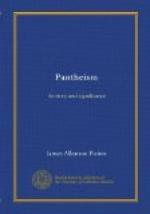Goethe and Wordsworth, in many inspired passages of their poetry, echo the faith of Spinoza. Wordsworth, of course, in the reaction from his first expectations of the new order that he hoped to see arise out of the French Revolution, was Inclined to magnify the Importance of established religious ceremonies and creeds. But we cannot suppose that he ever repented of his reverence for Nature as a divine revelation. And we may believe that he continued to regard his practically pantheistic visions as an insight into the eternal reality from which the detailed schemes of orthodox theology were projected.
[Sidenote: Schleiermacher.]
That Schleiermacher was much indebted to Spinoza is abundantly evident from his own words. He spoke of “the holy repudiated Spinoza.” He declared that “the high world-spirit penetrated him; the Infinite was his beginning and his end; the universe his only and eternal love. In holy innocence and lowliness, he mirrored himself in the eternal world, and saw himself as its most love-worthy image. He was full of religion and of the Holy Spirit; and therefore he stands alone and unreachable, master in his art above the profane multitude, without disciples and without citizenship."[22]
[Sidenote: Anglican Broad Churchmen.]
Coming down to Anglican Broad Churchmen, it would scarcely be fair to quote isolated utterances as proofs of their Pantheism. And yet when Frederick Robertson asked, “What is this world itself but the form of Deity whereby the manifoldness and beauty of His mind manifests itself?” and still farther, when he quotes with approval Channing’s word, that “perhaps matter is but a mode of thought,” the most earnest Pantheist would hardly desire more. For the conception of the Universe involved must surely exclude the real being, or even the real existence, of anything but God. Matthew Arnold never committed himself to Pantheism, nor, indeed, to any other theory of the Universe. For his delicate humour and lambent satire always had in view simply the practical object of clearing a plain way for the good life through the “Aberglaube” of theology. His description of God as “the Power not ourselves which makes for righteousness,” might seem, in fact, the negation of Pantheism, because, if God is not ourselves, there is something other than God. But the man who deliberately justified the loose phraseology of the Bible about infinite Being, by the plea that it was language “thrown out” at an object infinitely transcending linguistic expression, ought not himself to be pinned to the implications logically deducible from his own words “thrown out” at the same transcendant object. And, though Matthew Arnold was too literary to be a Pantheist, that is, though he thought more of forms of expression than of ultimate reality, his satirical disintegration of the creeds, wherever it is effective, makes Pantheism the only religious alternative. So-called “secular” and godless alternatives may be offered; but their incongruity with the whole evolution of humanity from prehistoric animism to the higher Pantheism will make their doom short and sure.




